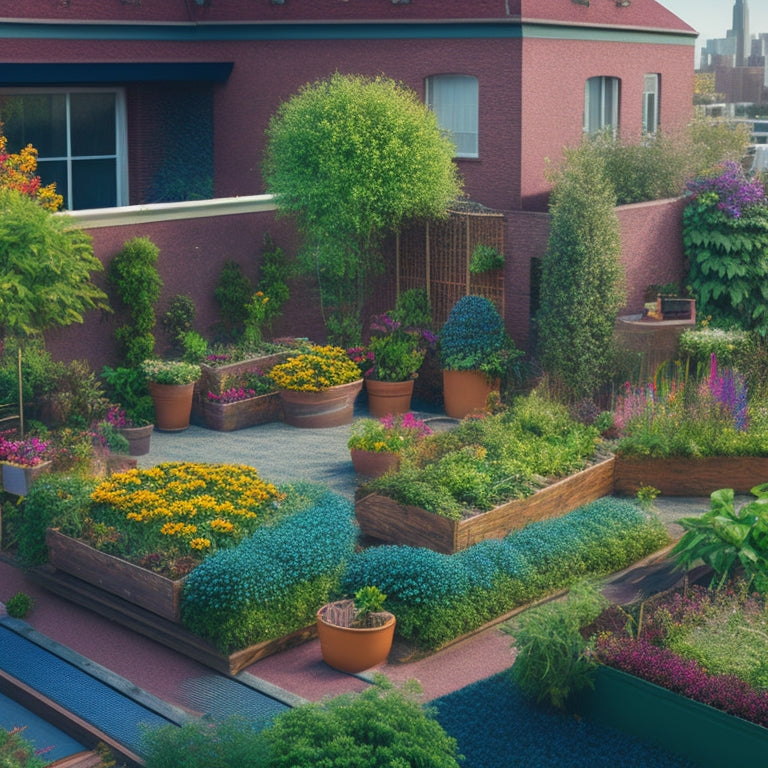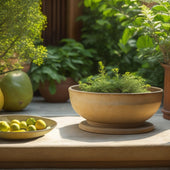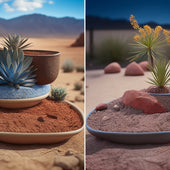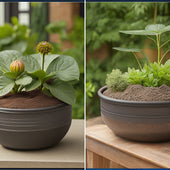
7 Natural Boosters for Rooftop Vegetable Growth Rate
Share
By incorporating natural enhancers into your rooftop garden, you can significantly hasten vegetable growth rates. Compost tea provides a nutrient-rich solution for healthy plant growth, while worm castings create a thriving ecosystem for soil structure. Epsom salt enhances seedling growth with essential magnesium and sulfur, and banana peels optimize potassium levels for fruit production. Coffee grounds recycle waste and create acidic soil, ideal for acid-loving vegetables. Alfalfa meal and bokashi optimize soil nitrogen levels and stimulate microbial activity, leading to robust soil health. Use these 7 natural enhancers to unleash your rooftop garden's full potential and discover the secrets to a bountiful harvest.
Compost Tea for Nutrient Boost
You can create a nutrient-rich solution for your rooftop vegetables by brewing compost tea, which involves steeping a bucket of compost in water to release beneficial microbes and soluble nutrients.
This organic fertilizer is a natural remedy to boost plant growth, promoting healthy roots, stems, and leaves. As you brew the compost tea, the microorganisms multiply, releasing enzymes that break down complex nutrients into easily absorbable forms.
This nutrient-dense liquid fertilizer is an excellent addition to your gardening routine, providing a slow release of nutrients that won't burn your plants.
To make compost tea, simply add one bucket of compost to 10 gallons of water and let it steep for 24-48 hours. Strain the liquid and use it as a foliar spray or add it to your irrigation system.
With compost tea, you can expect to see improved plant growth, increased yields, and stronger, more resilient plants. By incorporating this natural gardening tip into your routine, you'll be well on your way to growing thriving, chemical-free rooftop vegetables.
Worm Castings for Soil Health
By incorporating worm castings into your rooftop vegetable garden, you'll create a thriving ecosystem that fosters healthy soil structure, promotes beneficial microbial activity, and supports robust plant growth.
Worm castings, a natural and organic fertilizer, are rich in nutrients, micronutrients, and beneficial microorganisms that stimulate plant growth and development.
As a soil amendment, worm castings improve soil aeration, water retention, and drainage, creating an ideal environment for root growth.
The castings also contain humic acids, which enhance soil fertility and structure, allowing your vegetables to absorb essential nutrients more efficiently.
By using worm castings, you're providing your plants with a slow-release fertilizer that promotes sustained growth and development.
This natural approach to soil health eliminates the need for synthetic fertilizers, allowing you to grow healthy, chemical-free vegetables that not only taste better but also contribute to a more sustainable and liberated food system.
Epsom Salt for Seedlings Growth
Adding Epsom salt to your seedling mix can greatly enhance their growth rate, as it provides essential magnesium and sulfur that facilitate cell wall development and chlorophyll production. These micronutrients are essential for seedlings to develop strong roots and stems, setting them up for success in their early stages.
You'll notice an improvement in water retention, as Epsom salt helps seedlings absorb and retain water more efficiently. This is especially important for rooftop gardens, where water may be scarce or evaporate quickly.
As your seedlings grow, Epsom salt also boosts nutrient absorption. Magnesium and sulfur help break down nutrients, making them more accessible to your plants. This means you'll see faster growth, stronger leaves, and more vibrant colors.
When used in combination with other natural boosters, Epsom salt can have a significant impact on your rooftop garden's overall health and productivity. By incorporating Epsom salt into your seedling mix, you're giving your plants the best possible start in life, setting them up for a bountiful harvest.
Banana Peels for Potassium Rich
During the early stages of rooftop vegetable growth, incorporating banana peels into your soil can enhance potassium levels, an important macronutrient that promotes healthy plant development and fruit production.
As you're building your DIY fertilizer mix, consider adding banana peels to the mix. They're rich in potassium, which helps regulate water balance, promotes healthy root growth, and supports overall plant health.
Here are three benefits of using banana peels in your organic gardening tips:
-
Improved fruit production: Potassium from banana peels helps regulate water balance, leading to healthier fruit production and better yields.
-
Stronger roots: Banana peels provide essential potassium for healthy root growth, making your plants more resilient to stress and disease.
-
Natural pest control: Banana peels contain compounds that repel nematodes, a common pest that can harm your rooftop vegetables.
Coffee Grounds for Soil Acidity
When you incorporate coffee grounds into your rooftop vegetable garden's soil, you're not only recycling waste but also creating a more acidic environment that benefits your plants.
You'll want to aim for an ideal pH level between 6.0 and 6.8, as this range allows for better nutrient absorption and promotes healthy root development.
Acidic Soil Benefits
By incorporating coffee grounds into your rooftop garden's soil, you can effectively lower its pH level, creating an acidic environment that benefits specific vegetables and promotes healthy microbial activity.
This is especially beneficial for acid-loving vegetables like tomatoes, peppers, and cucumbers, which thrive in soil with a pH between 6.0 and 6.8.
Here are three key benefits of acidic soil in your rooftop garden:
-
Improved nutrient uptake: Acidic soil allows vegetables to absorb essential nutrients like nitrogen, phosphorus, and potassium more efficiently, promoting healthy growth and development.
-
Increased microbial activity: Acidic soil fosters a diverse range of microorganisms, which break down organic matter, solubilize minerals, and fight off pathogens, creating a balanced ecosystem.
-
Enhanced disease resistance: Acidic soil can help prevent diseases caused by fungal pathogens, which thrive in alkaline environments, reducing the need for chemical pesticides and fungicides.
Optimal Ph Levels
You can fine-tune the acidity of your rooftop garden's soil by targeting a specific pH range. The most suitable pH level for your vegetables depends on the type of plants you're growing. For most vegetables, an ideal pH range is between 6.0 and 7.0, with some tolerating slightly acidic or alkaline conditions.
To determine your soil's current pH, use pH testing methods like litmus paper, pH meters, or send samples to a lab for analysis.
If your soil pH is too high or low, you can adjust it using natural solutions. For acidic soils, add lime or wood ash to raise the pH. For alkaline soils, incorporate elemental sulfur, peat moss, or coffee grounds to lower the pH.
Coffee grounds, in particular, are an excellent natural acidifier, containing about 2% nitrogen and 0.3% phosphorus. By mixing 1-2 cups of coffee grounds into the soil, you can create a nutrient-rich environment that supports healthy microbial activity and promotes robust vegetable growth.
Alfalfa Meal for Nitrogen Fixing
Alfalfa meal, a nitrogen-rich organic fertilizer, injects new life into rooftop vegetable gardens by providing a natural boost to plant growth rates. As you work towards creating a thriving rooftop garden, you're likely aware of the importance of nitrogen sources for healthy plant growth.
Alfalfa meal is an excellent natural alternative to synthetic fertilizers, offering numerous alfalfa benefits for your plants.
Here are three key reasons to incorporate alfalfa meal into your rooftop gardening routine:
-
Rich in Nitrogen: Alfalfa meal contains a high concentration of nitrogen, making it an ideal fertilizer for promoting healthy plant growth and development.
-
Improves Soil Structure: Alfalfa meal helps to enhance soil structure, increasing its water-holding capacity and aeration, which in turn supports robust root growth.
-
Natural and Non-Toxic: As an organic fertilizer, alfalfa meal is free from harsh chemicals, ensuring a safe and healthy growing environment for your plants.
Bokashi for Microbial Activity
While optimizing soil nitrogen levels with alfalfa meal, rooftop gardeners can further stimulate plant growth by introducing bokashi, a fermented fertilizer that turbocharges microbial activity in the soil.
By doing so, you'll create a thriving ecosystem where microorganisms flourish, leading to increased microbial diversity. This, in turn, enhances nutrient absorption, allowing your rooftop vegetables to receive the essential nutrients they need to grow strong and healthy.
Bokashi's fermented microorganisms work in harmony with the soil's existing microbiome, breaking down organic matter and releasing nutrients in a form easily absorbed by plants. This synergy promotes robust soil health, which is the foundation of vigorous plant growth.
As you incorporate bokashi into your rooftop garden, you'll notice a significant boost in plant growth rates, thanks to the enhanced microbial activity. By fostering a balanced soil ecosystem, you're empowering your plants to reach their full potential, ultimately leading to a more abundant and resilient harvest.
Frequently Asked Questions
Can I Use Store-Bought Compost Instead of Making My Own?
"Did you know 60% of household waste can be composted? You can use store-bought compost, but it may lack personalized nutrients; consider DIY composting, which offers customized benefits - follow our step-by-step guide to get started!"
How Often Should I Water My Rooftop Vegetable Garden?
You'll want to water your rooftop vegetables when the top 2-3 inches of soil feel dry, considering temperature control and soil quality, as best watering frequency promotes nutrient absorption and healthy growth.
Are There Any Specific Rooftop Vegetable Varieties for Beginners?
'As you venture into rooftop gardening, you'll find that compact, disease-resistant varieties like patio tomatoes and leafy greens thrive in container gardening, while soil quality and pest control measures, like vertical gardening, guarantee a bountiful harvest.'
Do I Need to Rotate My Rooftop Vegetable Crops Seasonally?
You'll want to rotate your rooftop vegetable crops seasonally to maintain soil health, avoiding nutrient deficiencies and pests. Crop rotation offers benefits like improved yields and reduced challenges, but requires careful planning to execute effectively.
Can I Grow Rooftop Vegetables in Partial Shade Conditions?
"You're a navigator charting the course for your rooftop garden, and partial shade is the uninvited passenger. Steer clear of sun-hungry veggies and opt for shade-tolerant ones like lettuce and herbs, placing them strategically to maximize limited sunlight, and maintain with gentle care."
Related Posts
-

10 Natural Ways to Clean Your Planters
You can transform your planters from grimy to gleaming with these 10 natural cleaning solutions. Mix baking soda and ...
-

10 Natural Ways to Clean Your Planters
You can transform your planters from grimy to gleaming with these 10 natural cleaning solutions. Mix baking soda and ...
-

10 Natural Ways to Clean Your Planters
You can transform your planters from grimy to gleaming with these 10 natural cleaning solutions. Mix baking soda and ...
-

10 Natural Ways to Clean Your Planters
You can transform your planters from grimy to gleaming with these 10 natural cleaning solutions. Mix baking soda and ...
-

10 Natural Ways to Clean Your Planters
You can transform your planters from grimy to gleaming with these 10 natural cleaning solutions. Mix baking soda and ...
-

10 Natural Ways to Clean Your Planters
You can transform your planters from grimy to gleaming with these 10 natural cleaning solutions. Mix baking soda and ...
-

10 Natural Ways to Clean Your Planters
You can transform your planters from grimy to gleaming with these 10 natural cleaning solutions. Mix baking soda and ...
-

10 Natural Ways to Clean Your Planters
You can transform your planters from grimy to gleaming with these 10 natural cleaning solutions. Mix baking soda and ...
-

10 Natural Ways to Clean Your Planters
You can transform your planters from grimy to gleaming with these 10 natural cleaning solutions. Mix baking soda and ...
-

10 Natural Ways to Clean Your Planters
You can transform your planters from grimy to gleaming with these 10 natural cleaning solutions. Mix baking soda and ...
-

10 Natural Ways to Clean Your Planters
You can transform your planters from grimy to gleaming with these 10 natural cleaning solutions. Mix baking soda and ...
-

10 Natural Ways to Clean Your Planters
You can transform your planters from grimy to gleaming with these 10 natural cleaning solutions. Mix baking soda and ...
-

10 Natural Ways to Clean Your Planters
You can transform your planters from grimy to gleaming with these 10 natural cleaning solutions. Mix baking soda and ...
-

10 Natural Ways to Clean Your Planters
You can transform your planters from grimy to gleaming with these 10 natural cleaning solutions. Mix baking soda and ...
-

10 Natural Ways to Clean Your Planters
You can transform your planters from grimy to gleaming with these 10 natural cleaning solutions. Mix baking soda and ...
-

10 Natural Ways to Clean Your Planters
You can transform your planters from grimy to gleaming with these 10 natural cleaning solutions. Mix baking soda and ...
-

10 Natural Ways to Clean Your Planters
You can transform your planters from grimy to gleaming with these 10 natural cleaning solutions. Mix baking soda and ...
-

10 Natural Ways to Clean Your Planters
You can transform your planters from grimy to gleaming with these 10 natural cleaning solutions. Mix baking soda and ...
-

10 Natural Ways to Clean Your Planters
You can transform your planters from grimy to gleaming with these 10 natural cleaning solutions. Mix baking soda and ...
-

10 Natural Ways to Clean Your Planters
You can transform your planters from grimy to gleaming with these 10 natural cleaning solutions. Mix baking soda and ...
-

10 Natural Ways to Clean Your Planters
You can transform your planters from grimy to gleaming with these 10 natural cleaning solutions. Mix baking soda and ...
-

10 Natural Ways to Clean Your Planters
You can transform your planters from grimy to gleaming with these 10 natural cleaning solutions. Mix baking soda and ...
-

10 Natural Ways to Clean Your Planters
You can transform your planters from grimy to gleaming with these 10 natural cleaning solutions. Mix baking soda and ...
-

10 Natural Ways to Clean Your Planters
You can transform your planters from grimy to gleaming with these 10 natural cleaning solutions. Mix baking soda and ...
-

10 Natural Ways to Clean Your Planters
You can transform your planters from grimy to gleaming with these 10 natural cleaning solutions. Mix baking soda and ...
-

10 Natural Ways to Clean Your Planters
You can transform your planters from grimy to gleaming with these 10 natural cleaning solutions. Mix baking soda and ...
-

10 Natural Ways to Clean Your Planters
You can transform your planters from grimy to gleaming with these 10 natural cleaning solutions. Mix baking soda and ...
-

10 Natural Ways to Clean Your Planters
You can transform your planters from grimy to gleaming with these 10 natural cleaning solutions. Mix baking soda and ...
-

10 Natural Ways to Clean Your Planters
You can transform your planters from grimy to gleaming with these 10 natural cleaning solutions. Mix baking soda and ...
-

10 Natural Ways to Clean Your Planters
You can transform your planters from grimy to gleaming with these 10 natural cleaning solutions. Mix baking soda and ...
-

10 Natural Ways to Clean Your Planters
You can transform your planters from grimy to gleaming with these 10 natural cleaning solutions. Mix baking soda and ...
-

10 Natural Ways to Clean Your Planters
You can transform your planters from grimy to gleaming with these 10 natural cleaning solutions. Mix baking soda and ...
-

10 Natural Ways to Clean Your Planters
You can transform your planters from grimy to gleaming with these 10 natural cleaning solutions. Mix baking soda and ...
-

10 Natural Ways to Clean Your Planters
You can transform your planters from grimy to gleaming with these 10 natural cleaning solutions. Mix baking soda and ...
-

10 Natural Ways to Clean Your Planters
You can transform your planters from grimy to gleaming with these 10 natural cleaning solutions. Mix baking soda and ...
-

Preventing Soil Settlement in DIY Planters
To prevent soil settlement in your DIY planters, you'll want to focus on selecting a well-balanced soil mix with good...
-

Preventing Soil Settlement in DIY Planters
To prevent soil settlement in your DIY planters, you'll want to focus on selecting a well-balanced soil mix with good...
-

Preventing Soil Settlement in DIY Planters
To prevent soil settlement in your DIY planters, you'll want to focus on selecting a well-balanced soil mix with good...
-

Preventing Soil Settlement in DIY Planters
To prevent soil settlement in your DIY planters, you'll want to focus on selecting a well-balanced soil mix with good...
-

Preventing Soil Settlement in DIY Planters
To prevent soil settlement in your DIY planters, you'll want to focus on selecting a well-balanced soil mix with good...
-

Preventing Soil Settlement in DIY Planters
To prevent soil settlement in your DIY planters, you'll want to focus on selecting a well-balanced soil mix with good...
-

Preventing Soil Settlement in DIY Planters
To prevent soil settlement in your DIY planters, you'll want to focus on selecting a well-balanced soil mix with good...
-

Preventing Soil Settlement in DIY Planters
To prevent soil settlement in your DIY planters, you'll want to focus on selecting a well-balanced soil mix with good...
-

Preventing Soil Settlement in DIY Planters
To prevent soil settlement in your DIY planters, you'll want to focus on selecting a well-balanced soil mix with good...
-

Preventing Soil Settlement in DIY Planters
To prevent soil settlement in your DIY planters, you'll want to focus on selecting a well-balanced soil mix with good...
-

Preventing Soil Settlement in DIY Planters
To prevent soil settlement in your DIY planters, you'll want to focus on selecting a well-balanced soil mix with good...
-

Preventing Soil Settlement in DIY Planters
To prevent soil settlement in your DIY planters, you'll want to focus on selecting a well-balanced soil mix with good...
-

Preventing Soil Settlement in DIY Planters
To prevent soil settlement in your DIY planters, you'll want to focus on selecting a well-balanced soil mix with good...
-

Preventing Soil Settlement in DIY Planters
To prevent soil settlement in your DIY planters, you'll want to focus on selecting a well-balanced soil mix with good...
-

Preventing Soil Settlement in DIY Planters
To prevent soil settlement in your DIY planters, you'll want to focus on selecting a well-balanced soil mix with good...
-

Preventing Soil Settlement in DIY Planters
To prevent soil settlement in your DIY planters, you'll want to focus on selecting a well-balanced soil mix with good...
-

Preventing Soil Settlement in DIY Planters
To prevent soil settlement in your DIY planters, you'll want to focus on selecting a well-balanced soil mix with good...
-

Preventing Soil Settlement in DIY Planters
To prevent soil settlement in your DIY planters, you'll want to focus on selecting a well-balanced soil mix with good...
-

Preventing Soil Settlement in DIY Planters
To prevent soil settlement in your DIY planters, you'll want to focus on selecting a well-balanced soil mix with good...
-

Preventing Soil Settlement in DIY Planters
To prevent soil settlement in your DIY planters, you'll want to focus on selecting a well-balanced soil mix with good...
-

Preventing Soil Settlement in DIY Planters
To prevent soil settlement in your DIY planters, you'll want to focus on selecting a well-balanced soil mix with good...
-

Preventing Soil Settlement in DIY Planters
To prevent soil settlement in your DIY planters, you'll want to focus on selecting a well-balanced soil mix with good...
-

Preventing Soil Settlement in DIY Planters
To prevent soil settlement in your DIY planters, you'll want to focus on selecting a well-balanced soil mix with good...
-

Preventing Soil Settlement in DIY Planters
To prevent soil settlement in your DIY planters, you'll want to focus on selecting a well-balanced soil mix with good...
-

What Depth Is Best for My Planter
When selecting a planter, consider the root depth requirements of your chosen plant species, as this dictates the min...
-

What Depth Is Best for My Planter
When selecting a planter, consider the root depth requirements of your chosen plant species, as this dictates the min...
-

What Depth Is Best for My Planter
When selecting a planter, consider the root depth requirements of your chosen plant species, as this dictates the min...
-

What Depth Is Best for My Planter
When selecting a planter, consider the root depth requirements of your chosen plant species, as this dictates the min...
-

What Depth Is Best for My Planter
When selecting a planter, consider the root depth requirements of your chosen plant species, as this dictates the min...
-

What Depth Is Best for My Planter
When selecting a planter, consider the root depth requirements of your chosen plant species, as this dictates the min...
-

What Depth Is Best for My Planter
When selecting a planter, consider the root depth requirements of your chosen plant species, as this dictates the min...
-

What Depth Is Best for My Planter
When selecting a planter, consider the root depth requirements of your chosen plant species, as this dictates the min...
-

What Depth Is Best for My Planter
When selecting a planter, consider the root depth requirements of your chosen plant species, as this dictates the min...
-

What Depth Is Best for My Planter
When selecting a planter, consider the root depth requirements of your chosen plant species, as this dictates the min...
-

What Depth Is Best for My Planter
When selecting a planter, consider the root depth requirements of your chosen plant species, as this dictates the min...
-

What Depth Is Best for My Planter
When selecting a planter, consider the root depth requirements of your chosen plant species, as this dictates the min...
-

What Depth Is Best for My Planter
When selecting a planter, consider the root depth requirements of your chosen plant species, as this dictates the min...
-

What Depth Is Best for My Planter
When selecting a planter, consider the root depth requirements of your chosen plant species, as this dictates the min...
-

What Depth Is Best for My Planter
When selecting a planter, consider the root depth requirements of your chosen plant species, as this dictates the min...
-

What Depth Is Best for My Planter
When selecting a planter, consider the root depth requirements of your chosen plant species, as this dictates the min...
-

What Depth Is Best for My Planter
When selecting a planter, consider the root depth requirements of your chosen plant species, as this dictates the min...
-

What Depth Is Best for My Planter
When selecting a planter, consider the root depth requirements of your chosen plant species, as this dictates the min...
-

What Depth Is Best for My Planter
When selecting a planter, consider the root depth requirements of your chosen plant species, as this dictates the min...
-

What Depth Is Best for My Planter
When selecting a planter, consider the root depth requirements of your chosen plant species, as this dictates the min...
-

What Depth Is Best for My Planter
When selecting a planter, consider the root depth requirements of your chosen plant species, as this dictates the min...


